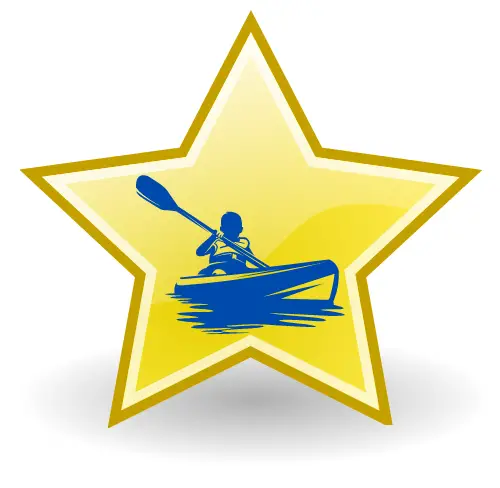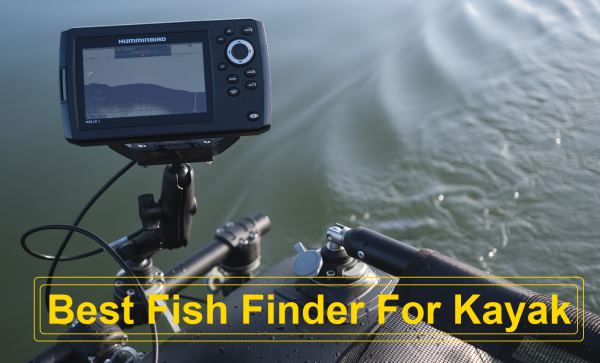In the early 90s, fish finders were first introduced to the world. They have been evolving and improving over the years, with a host of useful features that allow fishers all over the world to increase their catch rates, become more professional, and enhance their shore fishing experience.
Although you might believe that fish finders only tell you where fish are, it is actually a complex process. They use sonar technology to identify objects around you. Based on the distance sound waves travel, they can identify whether an object is a fish, seaweed, or simply a sunken one.
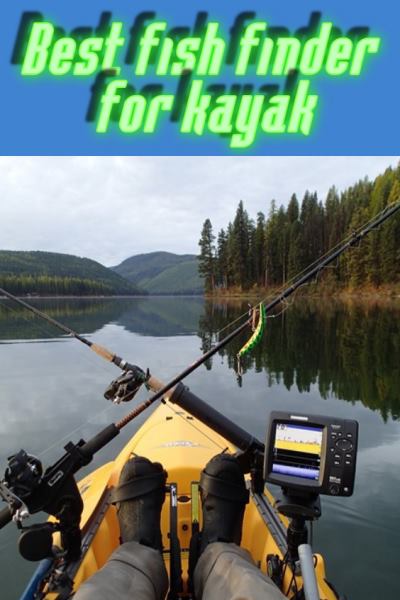
Other fishfinders have many additional features. Some fish finders even come with enough databases to allow you to target specific species. The great kayak fish finder can provide all the information you need to identify fish that are flatter, plumper, longer, shorter, faster swimmers, or slower swimmers. This information can be used to determine whether the fish in front of it meets the criteria. This is truly amazing.
Table of Contents
The Best Fish Finder For Kayaks In Our Opinion In 2023






Last update on 2024-04-24 / Affiliate links / Images from Amazon Product Advertising API
A Review Of The 8 Best Fish Finders For Kayaks
Let’s now get down to business and dissect these other fish finders’ models. We will discuss their best and most important attributes and explain why they have been included on this list.
Garmin Striker 4: Best Kayak Fish Finder


Last update on 2024-04-24 / Affiliate links / Images from Amazon Product Advertising API
Garmin Striker 4 kayak fish finder comes with an amazing array of features, including CHIRP sonar technology and advanced GPS. It’s truly the ultimate fish finder for a kayak.
Firstly, the ClearVu scanning technology and the CHIRP transducer combine to produce a nearly photographic image of everything below water. A dual display is also available on the screen. This allows you to view images from both the 77/200kHz transducer and keeps you updated on your GPS progress. You can also switch between the screens using the easy-to-use keypad. Although the HVGA 3.5-inch display is smaller than some, its impressive resolution of 480×320 really takes the edge off.
Garmin Striker fish finder can also be used in freshwater up to 1600 feet and salt water up to 750 feet. You can activate the flasher built into the fish finder to view your lure and all surrounding objects. This will make it easy to store your catch. This device also has IPX7 which is quite impressive. It also comes with transom- and trolling mounting accessories, which can be very useful.
Deeper PRO Fish Finders For Kayaks


Last update on 2024-04-24 / Affiliate links / Images from Amazon Product Advertising API
This kayak fish finder is truly one-of-a-kind. It is wireless and works only over Wi-Fi. Through the Fish Pro app, all data this fish finder for kayak collects will be available on your smartphone (iOS and android).
It includes a GPS, maps, a fishing log, and a diary. You can save all information about the routes, spots, and paths. You can then visit them again, or even study them from the comfort of your own home using your smartphone.
This makes it easy to share this information with other kayakers/anglers. The Deeper Pro’s transmission power is 90/290 kHz. This allows it to transmit a sharp image to your smartphone over
great distances. Once you have received a positive image, you can immediately get to work. Its maximum depth is 260 feet.
Every device has its limitations. The Deeper Pro is no exception. It’s heavy. It weighs in at 3.5 oz. To cast it easily, you will need a sturdy, durable rod. Otherwise, it could snap.
The battery life of this fish finder isn’t the best on the market. It can only last for 5.5 hours so make sure you have a power bank in order to charge it.
Venterior VT-FF001 – Best Budget Fish Finders For Kayaks


Last update on 2024-04-24 / Affiliate links / Images from Amazon Product Advertising API
If you are on a tight budget, these compact best fish finders from Venterior VT-FF001 are a great choice. The LCD distinguishes between fish, rocks, and seaweeds. The backlight mode ensures that you will always be able to see what is underwater, day or night.
You can adjust the sensitivity of these best kayak fish finders to display what you want and need. You can turn the sensitivity up to the maximum level if you want to see everything. If you don’t mind small fish, lower the sensitivity. It also has a battery-saving mode that you can activate in the last 30 minutes to prolong your on-water time.
It also has an integrated fish alarm, which alerts you if any fish schools are within its vicinity. It can also work in extreme temperatures such as -20degC, making it durable and versatile. This device can reach a maximum depth of 328 feet. It also has a sonar frequency of 200 kHz. You’ll get the excellent signal to go as far as you want to place your bait.
Venterior Portable Rechargeable Fish Finders For Kayaks – Best Accuracy


Last update on 2024-04-24 / Affiliate links / Images from Amazon Product Advertising API
Venterior Portable Rechargeable prior’s the fourth model is also on the list. It offers great sensitivity, just like its sibling, VT-FF001. It takes accuracy and detection to another level. It tells you if the fish is small or large as well as its position in the water column. The wireless fish finders can be cast and mounted anywhere you like. It also has two holes that let you hook it up to your kayak fishing line. This transmitter has a transmission power of up to 125kHz.
We have spoken of the outstanding LCD in two versions: colors and black/white. These options enable
you to see clearly at night and day. This fish finder, like the others on this list, has its drawbacks. It can only be used to 131 feet in depth, does not have GPS, and lacks an LED screen.
Humminbird 410210 – Best Fish Finders Graphics


Last update on 2024-04-24 / Affiliate links / Images from Amazon Product Advertising API
The graphics and display are the keys to this kayak fish finder from Humminbird. This device comes with a 5-inch WVGA screen that has a resolution of 800×486 pixels. The TFT display offers 256 colors.
All of this combined with the images from the CHIRP and Beam Plus will show you what a high-quality fishfinder should look like.
It also comes with an SD card and an integrated GPS. You can store more of your newly discovered spots and routes. You can also use the 5-inch display in landscape orientation.
Through a transducer that can reach a maximum depth of 1500 feet, the CHIRP and down imaging frequencies of CHIRP are transmitted with the power of 50 to 200 kHz.
This best fish finder has a problem because it doesn’t have a mounting bracket. It is also very large, making mounting it difficult. It’s also quite innovative, but it can be difficult for beginners to understand.
Lowrance HOOK 2 – Best Fish Finder


Last update on 2024-04-24 / Affiliate links / Images from Amazon Product Advertising API
Lowrance hook, a synonym for fish-finding excellence and one of the most advanced sonar devices available in the world, is synonymous with Lowrance.
The Lowrance hook 2 model, a 5-inch fish finder equipped with TripleShot transducer as well as US inland lakes maps pre-installed, is an example.
It is very user-friendly with phone-like menus, auto-tuning, and SONAR. This allows you to spend more time kayak fishing than fiddling with buttons.
The CHIRP SONAR cone has twice the coverage than rival models. And the SolarMax display provides crisp, clear feedback and excellent visibility in the daylight. A GPS plotter lets you add waypoints to navigate the waters where you fish.
Vexilar SP200 T-Box Smartphone Fish Finder


Last update on 2024-04-24 / Affiliate links / Images from Amazon Product Advertising API
A company that’s known for making some of the best ice fishing finders on the market, Vexilar SP200 T-Box brings us this ingenious smartphone fish finder – that’s as compact as your own device.
This system can be installed as an accessory and is easy to install. It has a maximum depth limit of 240 feet.
The alarms can be heard for shallow conditions, fish, and low batteries and it is a fish finder and can work in any part of the world. You only need a 12-Volt power supply and a compatible smartphone OS.
Garmin Echomap UHD 93sv Chartplotter – Best Kayak Fish Finder


Last update on 2024-04-24 / Affiliate links / Images from Amazon Product Advertising API
Garmin has added another Garmin product, the Echomap fish finder/transducer from GPS experts. It offers key-assisted touch screen capabilities. The screen measures nine inches and is super-bright. It is easily readable in sunlight. This is the perfect spot for center console use by most kayak anglers.
The pre-installed software covers over 17,000 US lakes. It also includes a GT54 transducer that can be used for ultra-high-definition readings, CHIRP, and side-view SONAR capabilities.
You can create personalized Quickdraw maps with 1-inch contours that you can share with your community.
It can even be used with the Force trolling motor, which allows you to control the motor from your unit. They will think of the next thing.
How to Pick the Best Kayak Fish Finder
After we have discussed the many amazing kayak’s best fish finders, let us walk you through the options that you should consider when searching for the best fish finder.
Water depth
If you are interested in deep-sea fisherman ships, this feature is crucial. Most fishermen prefer to fish at depths between the most common waterfronts. A side-imaging unit will suffice.
If deep-water kayak fishing is your passion, you may want to consider a down-imaging device. You’ll get a better view of the world below you.
GPS
A GPS pre-installed onto your best fish finder will take you to another level. This allows you to not only explore new areas but also to create new routes by pinning new spots.
Kayaking is a great way to get anywhere. However, not all best fish finders have GPS. This will increase the cost of your equipment.
Mounting Style and Space Available
To ensure your fish finder is in the most convenient position possible, sit down in your kayak and relax. Next, grab your pedals, store your gear and begin placing the best fish finder around your kayak’s
front in different positions. This will help you determine the most convenient place while also giving you the best view possible of your route.
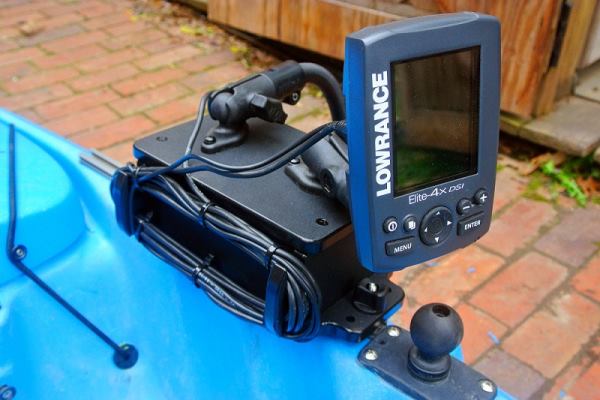
You must also consider the dimensions and size of your fish finder in order to determine the kayak’s size and how much space it can hold.
There are many options for mounting the device. We’ll be discussing them in a moment. You can attach it to your hull by cleaning the area and applying silicone. Other DIY projects that you can do with sponges or pool noodles are acceptable.
The scrubber holes are the next option. This is convenient because everything is already there and takes very little effort. You should be aware that your boat could become clogged with water if it fills up. This is the main purpose of scrubber holes.
We do not recommend transom mounting. Transom mounting allows you to mount your transducer at either the stern or the rear of your kayak fishing. Your sensitive device will be exposed to all collisions. Therefore, it’s quite dangerous.
Transducer
The heart and soul of every best fish finder is its transducer. The transducer uses sonar technology for identifying objects and creatures in its immediate vicinity. You can have multiple transducers or one device that emits a wider beam.
Sonar Type
Sonar technology has been around since the beginning of time. There are many variations. The two main sonars that relate to best fish finders are the 3D and the traditional sonar.
3D Sonar
The 3D sonar provides a clear view of the water below you, as the title suggests. The 3D sonar allows you to see everything clearly, so you have a better chance at catching your catch.
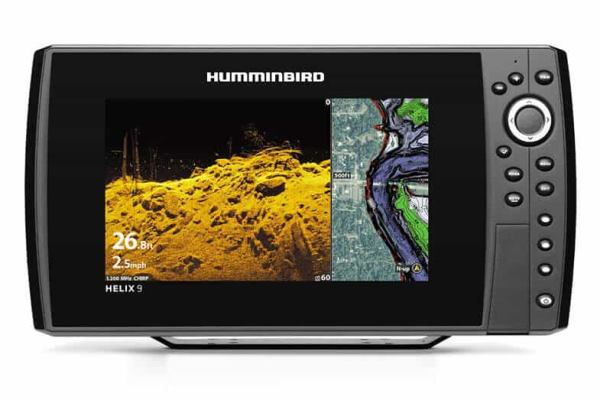
It does have a smaller beam and less coverage than conventional sonars. You might not want to use a 3D sonar in shallow waters.
Conventional Sonar
The conventional sonar, on the other hand, has a grainy image but, because it’s been around so long, it’s been improved in terms of beam coverage and length. You can cover larger areas and get deeper into the water with standard old-school sonar.
Cone Angle
The transducer’s range of operation is called the cone angle. Fishfinders have angles that range between 15deg to 20deg.
However, other devices can provide angles that extend from 10deg to 65deg. Transducers can now offer multiple beams simultaneously, including triple, quad, and dual beams, in order to provide maximum visibility. These technologies can eliminate the effects of depth on your beam. The rule of thumb is that the further you go, the clearer your image will become. This problem can be solved with multiple beams that cover many directions and areas.
Frequency Type
Fishfinders typically have frequencies between 50, 83, and 192 kHz. Higher frequencies are better for shallow water fishermen. Lower frequencies will work well for deep-water fishermen. Frequency doesn’t have to be high or low. There are four types of frequencies, each suitable for specific situations. We have already spoken of low and high frequencies. Now we’ll add dual frequencies and CHIRP to them.
High Frequency
High frequencies are more suitable for shallow water because they can accumulate more information in their waves. They will tell you much more about shallow waters than you. They won’t be able to transfer any useful information about the deepwater and what may exist.
Low Frequency
Low frequencies are the exact opposite of high frequencies. They can cut through the water and reach deeper to deliver a clear image to you. Unfortunately, this is not possible because they don’t have the information necessary to give you the sharp, clear image that you want.
Dual Frequencies
You get the best of both. Dual frequencies can be used to get clear images from both shallow and deep water. They also carry significant information. How you install your transducer will determine how clear it is.
CHIRP
The military-grade technology of Compressed High-Intensity Radar Pulse outperforms all others. It works by moving between frequencies with longer pings to produce outstanding images regardless of the conditions.
Smartphone compatibility
Fishfinders are powered by a 12V battery or other power sources. It is very possible that the power source will run out, so it is important to ensure smartphone compatibility.
You can transfer all data from your fishfinder to the phone by syncing it to it. This includes your route, pin locations, and how you got back to shore.
You can be sure that they won’t get lost, even if the battery runs out on your fishfinder. It’s an important feature that fishers should not overlook.
Display
The display is the output of all that we have discussed. All these technologies should be displayed on your fish finder at the end of each day. You need to be cautious when selecting the technology and screen that you will use on your display.
Screen Size
While you would want the largest display possible, it is not always the best option. It is important to compare the screen size to the dimensions of the fish finder and the space available on your kayak fishing.
A display of 4-5 inches would be an acceptable size for a kayak with a larger frame. A 3-inch display might be the best choice for a kayak that is smaller.
Resolution
The resolution is measured in pixels. It determines how sharp and clear the image will be. The screen resolution of a fish finder is 640 x 644.
Although you might be able to find lower resolutions for a much cheaper price, it is best not to go below 240×160 as this will render your display useless. If your budget allows, you can always go higher.
Color vs. Black/White
Fishfinders with black/white displays are just like TVs. Multi-chrome displays will enhance your experience and provide a clearer picture. Do not be deceived by the low price tag that white/black models often sport.
FAQ
Is a Fish Finder Waterproof?
The fish finder is not waterproof. It is water-resistant. This means it can withstand a few drops of water. It is not recommended to submerge it in water.
Your transducer, however, is completely waterproof because it is intended to be submerged or in direct contact with water at all times.
What is a Chartplotter Fish Finder?
A Chartplotter fish finder is designed with an advanced navigation system. It combines your Maps and GPS plus a few other technologies together, making your fishfinder a lot easier for you to interpret.
Therefore, you can utilize it more efficiently on your fishing trip
Do Fish Finders Need Any Accessories?
Fishfinders do not require accessories to function. Some manufacturers make their own accessories, which might make it easier. However, such accessories are not required. A mounting kit may make it easier to place your expensive fish finder.
Why should you consider a fish finder in your kayak?
Fishfinders can give you an edge in achieving greater success on the water. They are also fun and practical additions to your kayak setup.
They can also be used for GPS and navigation if they have those capabilities.
Where should a kayak fish finder be placed?
You should be able to reach the controls easily – and see the display. This will most likely be in the middle console of most kayaks. Fishing kayaks with the best features include a place for a transducer or fish finders.
It’s important to make sure that it doesn’t get in the way or hinder your casting and paddling. If you are using a pedal kayak, it is best to place the paddlers on the gunwale (kayak side).
Should I use a portable fish finder or a permanent one?
It’s entirely up to you. You can’t have one that is better than the other. It all depends on the quality and how portable a fish finder you want it. Each has its advantages and disadvantages. However, if you decide to mount a permanent fishfinder, it is a smart idea to ensure that it can be easily removed – you don’t want to leave a $1000 piece on the spot.
How well do fishing finders work?
It’s a great technology. This is a technology that humans have pretty much perfected. It all depends on how powerful each fish finder is, but they are almost guaranteed to help you catch more fish, provided you read them correctly.
Final Thoughts
We’ll sum it up by saying that a fish finder is an extremely useful tool that can be used in all kinds of situations.
Garmin Striker 4 fish finder is an expensive option, but it delivers unparalleled performance. It features a high-quality 7-inch display, CHIRP, ClearVü, and SideVü sonar technologies. Its GPS and charting capabilities are also unmatched.
The Deeper Pro will be our second runner-up. These are the best wireless fish finders on the market. It’s a great option to keep on hand, as it can be connected with your smartphone and synced all information. It’s a lightweight, small fish finder, and has a transmission power of 90/290kHz.
The Venterior VTFFF001 is our last recommendation. It’s a budget pick that we recommend for beginners or people who don’t want to spend a lot on fish finders. The fish finder includes an LCD, backlight, five levels of sensitivity, and a fish alert. It can also distinguish between all the things you see underwater.
Our best posts:
